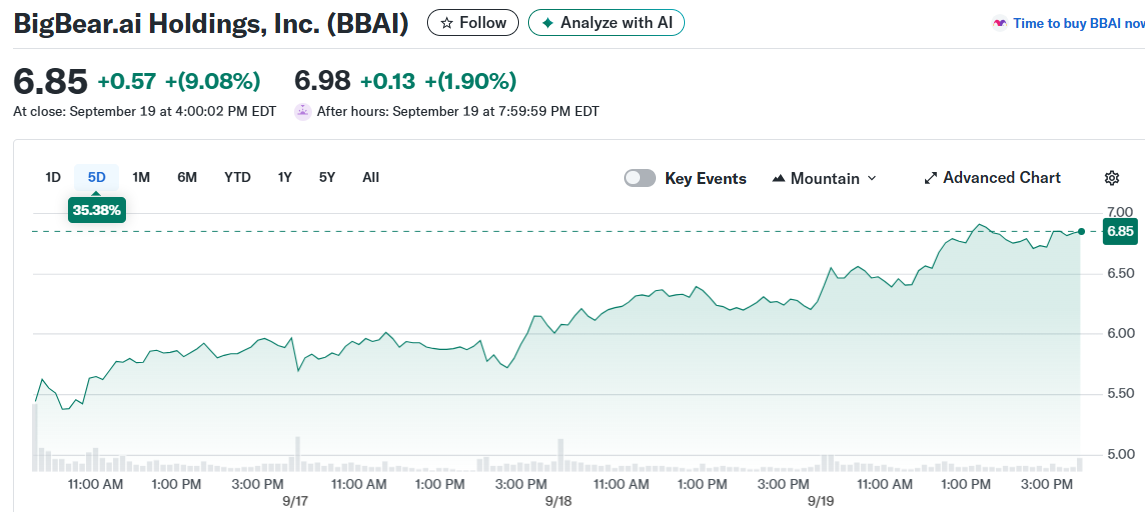TLDR
- BigBear.ai stock surged 35.4% this week following the Federal Reserve’s 25 basis point interest rate cut and guidance for additional cuts
- The company specializes in AI solutions for military platforms, border security, and facial recognition systems used at airports
- Second-quarter revenue dropped 18% to $32.5 million with a $228 million net loss and lowered full-year guidance to $125-140 million
- BigBear.ai struggles with scalability issues, operating at only 28% gross profit margins compared to Palantir’s 80%
- Stock is up 54% year-to-date but remains down 69% from all-time highs, with analysts forecasting continued revenue declines
BigBear.ai stock jumped 35.4% this week as the Federal Reserve cut interest rates by 25 basis points. The rate cut sparked investor interest in speculative growth stocks across the market.

The Fed also indicated plans for two additional rate cuts this year. This forward guidance helped drive gains for many AI and defense technology companies.
BigBear.ai stock has now gained 54% year-to-date with this week’s surge. The company’s market capitalization stands at approximately $3 billion.
The Maryland-based company provides AI solutions for government agencies and military applications. Its Orion Decision Support Platform supports the Department of Defense’s Joint Planning and Execution Community.
BigBear.ai also works on border security through biometric facial recognition systems. The company’s VeriScan product operates at over a dozen international airports and serves more than 60 airlines.
One of the company’s largest contracts is a $165 million Army award from last year. This contract involves transforming legacy military systems into AI-powered integrated platforms.
Revenue Struggles Continue
Second-quarter results showed revenue declining 18% to $32.5 million compared to the previous year. The company reported a net loss of $228 million for the quarter.
Management attributed the revenue drop to lower volume on some Army programs. BigBear.ai lowered its full-year guidance to between $125 million and $140 million.
This guidance represents a reduction from previous expectations of $160 million to $180 million. Last year, the company generated $158.2 million in total revenue.
Analysts surveyed by Yahoo Finance expect $133.5 million in revenue for the full year. This would represent a 15.6% decline from the previous year.
Next year’s revenue forecast stands at only $152 million. This projection remains below 2024 levels despite AI growth trends.
Scalability Challenges Persist
The company faces scalability issues compared to competitors like Palantir Technologies. BigBear.ai creates specific solutions for individual contracts rather than deploying a universal platform.
This approach limits profit margins to just 28% compared to Palantir’s 80% gross margins. Palantir’s platform can be deployed across various agencies and use cases.
BigBear.ai’s annual revenue has grown only 8.7% since 2022. Palantir achieved 85% revenue growth over the same three-year period.
Palantir recently hit $1 billion in quarterly sales for the first time. BigBear.ai’s quarterly revenue remains at $32.5 million.
The scalability difference shows in both companies’ market performance and investor confidence. BigBear.ai stock remains down 69% from its all-time high despite this week’s gains.
Trading volume this week reached 3.4 million shares compared to the average volume of 118.9 million. The stock’s 52-week range spans from $1.36 to $10.36.
The company’s current price of $6.88 reflects continued volatility in the defense AI sector. Investors remain cautious about BigBear.ai’s ability to scale its business model effectively.







